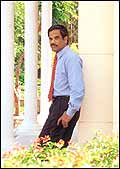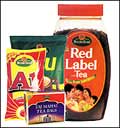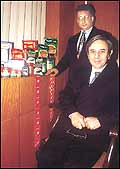








|
MARKETING
Tempest In A Tea Cup
Coffee, too. For Hindustan Lever on one
side, and Tata Tea and Tata Coffee on the other, are slugging it out for
supremacy in the Rs 3,700-crore beverages market.
By Shailesh
Dobhal
 Sipping
milk-less tea at hindustan lever limited's unremarkable South Mumbai HQ,
S. Ravindranath, the head of the company's beverages business is
explaining the in-your-face golden tabla promotion for flagship tea brand
Taj Mahal. For the benefit of those who blank ads-print and electronic-out
with the practised ease of a 21st century info-junkie, the campaign in
question started with a promise by long-time Taj endorser Zakir Hussain
that he would give up playing the tabla if someone found a better tea and
segued into a promotion to find the maestro's missing tablas. Back to
Ravindranath's explanation-''Taj Mahal's Ustad Challenge promotion has
nothing to do with the (impending) Tata Tetley launch.'' Sipping
milk-less tea at hindustan lever limited's unremarkable South Mumbai HQ,
S. Ravindranath, the head of the company's beverages business is
explaining the in-your-face golden tabla promotion for flagship tea brand
Taj Mahal. For the benefit of those who blank ads-print and electronic-out
with the practised ease of a 21st century info-junkie, the campaign in
question started with a promise by long-time Taj endorser Zakir Hussain
that he would give up playing the tabla if someone found a better tea and
segued into a promotion to find the maestro's missing tablas. Back to
Ravindranath's explanation-''Taj Mahal's Ustad Challenge promotion has
nothing to do with the (impending) Tata Tetley launch.''
 |
"We
are looking at the soft beverages segment to target the youth."
S. Ravindranath
Head (Beverages), HLL |
It is somehow apt that a British virtue,
understatement, be the flavour of statements emanating from two companies
fighting over a market, beverages, 90 per cent of which is accounted for
by a quintessentially British drink, tea. A few thousand kilometres from
Mumbai, in Kolkata, Homi R. Khusrokhan, Tata Tea's managing director is
equally non-combative while discussing the imminent launch of a clutch of
tea and coffee brands. ''Yes,'' admits the quiet-spoken Khusrokhan, ''we
are about to make some major waves, but we will wait till it happens to
tell the story.''
Don't let the quiet demeanours and quieter
words fool you. There's a battle brewing in the Rs 3,700-crore beverages
market. The growth rate has plummeted to a negative 8-10 per cent from
over 20 per cent just two years ago; consumers are either down-trading to
cheaper brands and unbranded offerings, or cutting down on consumption, or
both; and the three companies vying for dominance in the marketplace, HLL,
Tata Tea, and, to a lesser extent, Nestle India have discovered that
growth, at least in the short-term, can come only at the others' expense.
|
THE TATA
GAMEPLAN |
 STATUS:
Runner-up in tea with no premium brand; marginal presence in
coffee STATUS:
Runner-up in tea with no premium brand; marginal presence in
coffee
PLANS: Launch
Tetley at premium end of the market in February 2002
» Premier
Tetley at Barista in which Tata Coffee has a 34.3 per cent stake
» Focus
on power brands; phase out some smaller and regional brands
» Piggyback
on Tata Coffee's vending machine infrastructure
» Adopt
a wait and watch strategy for ready-to-drink teas and coffees |
|
THE HLL
GAMEPLAN |
 STATUS:
Market leader in tea; neck-to-neck with Nestle in coffee;
yet to firm up parlour-plans STATUS:
Market leader in tea; neck-to-neck with Nestle in coffee;
yet to firm up parlour-plans
PLANS:
Take concept of Hot Tea Shops national
» Launch
ready-to-drink tea/coffee like Lipton ice tea and cold coffee
targeted at the youth
» Launch
Lipton Yellow Label tea bags
» Reposition
existing tea brands
» Continue
aggressive promotional strategies
» Explore
new distribution options (fast food chains like Pizza Hut)
» Leverage
10,000 strong vending machine network for the entire range of
beverages
» Explore
options for a stake in a café-chain*
*HLL denies that it is doing
this |
|
THE NESTLE
GAMEPLAN |
 STATUS:
Market leader in coffee; a laggard in tea
business STATUS:
Market leader in coffee; a laggard in tea
business
PLANS: Fortify Nescafe &
Sunrise brands by possibly cutting price
» Take
Nestle Café national from the existing 7 outlets
» Re-launch
ice tea/specially brewed instant coffee
» Concentrate
on take-home soluble cold coffee brands, Frappe and Choc Café
» Leverage
international partnerships with McDonald's and Coca-Cola for
extending its distribution and co-launch new products in the
ready-to-drink segment |
And so the low-intensity (but high-stakes)
war has gone on. It is a contest being fought on many fronts: brands,
distribution, delivery formats (hot, cold, ready-to-drink), even, coffee
and tea parlours-between Barista, Café Coffee Day, Qwiky's, Movenpick,
and Nestle Café, there are over 100 of them across the country-for that
lucrative out-of-home consumer segment.
While Things Are Still Hot
If it doesn't happen before, then things will
surely come to a head in early 2002 when Tata Tea launches Tetley, a brand
from the fold of The Tetley Group-the UK-based beverage major acquired by
Tata Tea last year for Rs 1,870 crore (271 million pounds). The company is
certain to position the brand in the premium segment of the market, teas
costing over Rs 160 a kilogramme. That will bring it head to head with the
country's largest tea brand, HLL's Rs 200-crore Taj Mahal. Tetley is the
world's second-largest tea brand (after HLL-parent Unilever's Lipton) and
its launch will change the complexion of competition in a segment where
Taj has traditionally faced competition from minnows like Girnar Tea's
Girnar and Hasmukhrai & Company's Society.
There's more on HLL's plate. The recent
merger of the marketing infrastructure of Tata Tea and Tata Coffee (seen
by many as a sign of the impending merger of the two companies) means that
the FMCG major will, arguably, for the first time have to contend with an
integrated giant (much like itself). Tata Coffee will benefit from Tata
Tea's reach of over 6 lakh retail outlets, and the latter, from the
former's 2,500-odd vending machine network. Tetley is set to debut at the
Barista chain, in which Tata Coffee owns a 34.3 per cent stake. Then
there's the issue of the coffee marketer benefiting from the tea company's
much-vaunted marketing skills. In anticipation of the Tetley launch, Tata
Tea has already announced its decision to axe some smaller brands from its
portfolio and focus on just a few national ones like Tata Tea and Agni.
And in numerical terms, it has set itself the target of increasing its
share of the packaged tea market from 20 per cent now to 27 per cent in
three years.
Predictably, HLL's famed marketing machinery
has swung into overdrive. For one, there's the promotion for Taj. Then
there's the quiet launch of Lipton Yellow Label tea bags, a repositioning
exercise covering all its tea brands, and, if the rumour mills are to be
believed-HLL strongly denies this suggestion-the acquisition of a
strategic stake in a retail coffee chain.
 |
"We
will strengthen our regional focus while seeking a large national
share."
R. KhusrokhanHead MD, Tata Tea
(seen here with Deputy MD P.T. Siganporial) |
This bout of chest-thumping on the part of
the two largest players in the beverages market has galvanised a host of
me-too companies into reacting in kind. Duncans, the G.P. Goenka Group
company with a 4 per cent share of the tea market has relaunched its
offering in the premium segment, Sargam and launched tea-bag variants of
Sargam as well as another brand, Double Diamond. And the Ahmedabad-based
Gujarat Tea Processors & Packers Ltd has just launched a premium
blend, Good Morning.
Things are not very different in the smaller
coffee market. Tata Coffee is in the midst of a portfolio restructuring
exercise, will likely kill some of its brands like Tata Coorg Pure, and is
considering going national either on its own steam or through an
acquisition. ''We will put all our resources behind it (going national),''
says the company's Managing director M.H. Ashraff. In response, HLL has
extended the successful 'gold' promotion campaign it ran for tea brand
Taaza to coffee brand Deluxe Green Label. And coffee giant Nestle (which
refused to speak to BT for this article), is concentrating on extending
the franchise of its brands Nescafe and Sunrise to cold-coffee variants
Frappe and Choc Café. Why, industry sources say the reticent company may
even slash prices of its offerings to combat HLL and Tata Coffee.
The Tata Tea strategy, says Khusrokhan is to
''strengthen regional focus while seeking a larger national share''. So,
Tata Tea and Tetley will be national brands, and Agni Chakra Gold, Gemini,
and Kannan Devan will provide the regional back-up. And Tata Coffee will
leverage Tata Tea's strengths in branding and distribution, especially in
the southern part of the country which accounts for over 80 per cent of
the coffee consumed in India.
For Lever, it is just a question of
continuing to do what it has done so well in the past-grow volumes.
Ravindranath claims the recent promotion for Taj Mahal could see an
increase in volume sales of the brand by as much as 10 per cent. ''Volumes
are fine, but what about making money,'' asks Shalini Gupta, an analyst at
Mumbai-based Motilal Oswal Securities, who tracks the company. Gupta could
have a point; HLL has reportedly upped promotional spend on power
brands-and in beverages this includes the likes of Red Label, A1, Lipton
Taaza, Three Roses, Taj Mahal and Bru-by 30 per cent.
It isn't just promotions that HLL is betting
on; in an effort to tap the lucrative out-of-home segment for what
marketers term the ready-to-drink (RTD) market, the company is set to
launch Lipton Iced Tea, which has already been tested in several markets,
at Rs 12 for a 250-ml pack.
The Great Out-of-Home Boom
The battle will be fiercest for the
out-of-home consumer. The penetration of tea, at 99 per cent, is almost
total, and coffee suffers from being perceived as an expensive option and
not intrinsic to the food habits of over 80 per cent of the Indian
populace (its per capita consumption is 55 grammes compared to tea's 600
grammes). Ergo, growth can come only from brand-substitution, or tapping
the out-of-home market through RTD offerings, vending machines, even
coffee and tea bars.
"We are looking at the soft beverages
segment to target the youth," admits Ravindranath. HLL is also test
marketing an unnamed cold-coffee offering and hopes to launch it by next
year. But the real fun and games will start in early 2002 when the market
expects Nestle and Coke, who have an international partnership in the iced
tea and cold coffee categories, to launch their brands in India. These
will be sold through the 14,000 vending machines Nestle controls, and the
5 lakh-plus retail outlets that Coke reaches.
Tata Tea's Khusrokhan isn't averse to
entering this market, but prefers to wait. ''Building a market for RTD
teas is going to entail substantial investments and we could soon see the
entry of cola giants into this business; ideally we'd like to be the
second entrant.'' But that conservatism could hurt, much like it did Tata
Coffee, which entered the market in 1993 when HLL and Nestle were already
entrenched in the business. As a prelude, Tata Tea is helping Cadbury
Schweppes conduct market research for the latter's bottled ice tea brand,
Snapple. Snapple is one of the biggest customers of Tata Tea's US
operations.
But the fight for the out-of-home consumer
will be won in coffee (and tea) bars. There are already a 100 of these in
the country, and their number is expected to swell to 2,500 by 2004.
''Cafes will bring the zing back to coffee,'' predicts Harish Bijoor, the
former marketing head of Tata Coffee and now, the coo of Zip Telecom. No
serious player in the beverages business can afford to ignore this
opportunity. ''Out-of-home consumption is a high value-added business
model definitely worth pursuing for any company,'' agrees Khusrokhan.
Tata Coffee has Barista and Nestle is
following an independent path with Nestle Café, but hll denies that it
has any parlour plans of its own or that it is eyeing the acquisition of a
stake in the Bangalore-based Amalgamated Bean Coffee Trading Company's
Café Coffee Day chain. ''We are being wooed by several large companies,''
says V.G. Siddartha Hegde, ABC's promoter. The café phenomenon could just
be another retail-mirage. Neeraj Jain of Movenpick, the Swiss company that
recently opened its first coffee shop in New Delhi, admits that consumers
patronise cafes more for the ambience than the coffee and Sashi Chimala of
Qwiky's echoes this belief. Still, there's no denying the volumes a chain
of cafés will contribute to a beverage marketer. One analyst claims
Barista will consume 3,000 tonnes of coffee a year by 2004-a third of Tata
Coffee's annual produce.
What cafes are to the upwardly-mobile,
Lever's 25,000 'Hot Tea Shops'-small outlets that target the out-of-home
consumer with brands like A1-are to the mass market. But it is vending
machines that are key to the out-of-home strategies of all companies. HLL
has 10,000 of these and will soon make its entire beverage line available
through them; Tata Coffee has 2,500, and plans to increase the number to
4,000 by March 2002. And ABC plans to install 3,000 machines of its own by
2004, vending fresh instant coffee at the same price as instant coffee.
Restaurant partnerships provide another
avenue to beverage companies. Post Tata Coffee's acquisition of a stake in
Barista, the chain has made an appearance at select Taj hotels across the
country. McDonald's, with which Nestle is aligned globally, is currently
trying out the FMCG major's tea and coffee in some of its 30 outlets
across Delhi and Mumbai. And Tricon's marketing chief Pankaj Batra-the
company operates 21 Pizza Hut outlets across 10 cities-says the company
''is looking to increase beverage options at Pizza Hut and evaluating
potential partners''. The buzz in the market is that this partner will be
either HLL or Nestle.
All activity in the beverages market-despite
claims to the contrary by competing companies-is part of a run-up to
February, 2002. That's when Tata Tea will launch Tetley in what will be
the first public shot of a hitherto behind-the-scenes battle. And that
should stir things up.
-additional reporting by
Abir Pal, Debojyoti Chatterjee, Nitya Varadarajan
& Suveen K. Sinha
|

